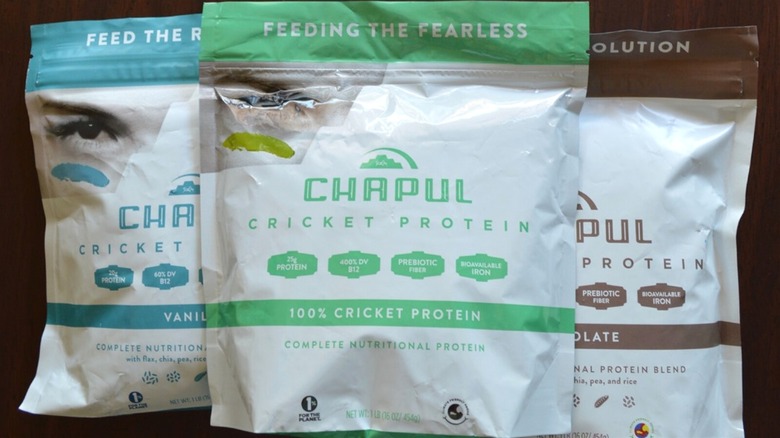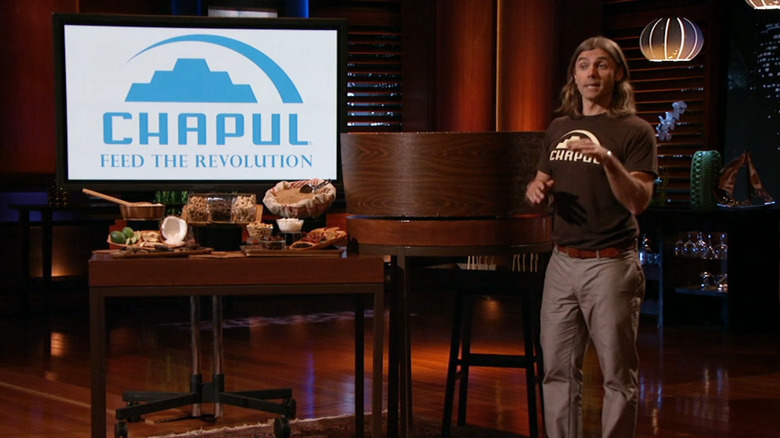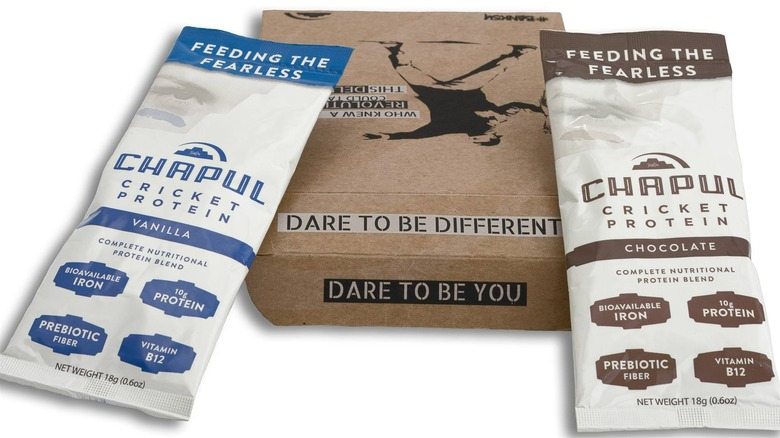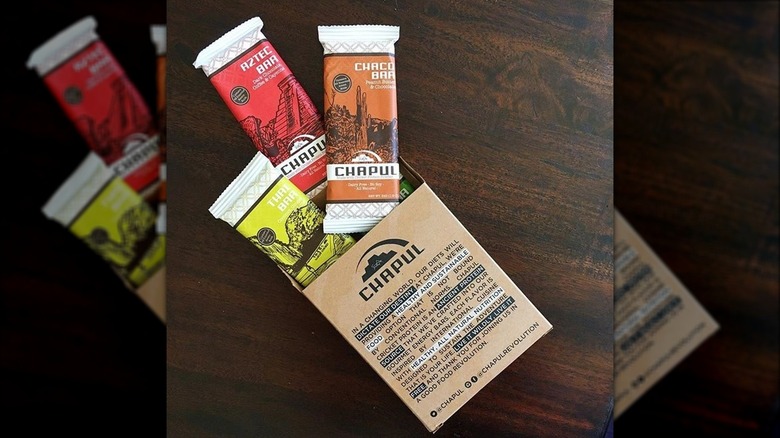What Happened To Chapul After Shark Tank?
Plenty of entrepreneurs dream of the day when they can pitch their product to a team of investors and get their business idea off the ground. And while some of the best foods on "Shark Tank" have been well-received, a few peculiar ones have made their way into the mix, too. Some concepts are so out there that all of the Sharks collectively bow out, leaving a chorus of crickets in their wake. When whitewater rafting guide Pat Crowley appeared on Season 5, Episode 21 of "Shark Tank" in 2014 to pitch his one-of-a-kind protein bar, however, he didn't hear crickets from the investor panel — instead, he asked them to eat some.
While it's true that almost 80% of countries eat insects because of their high protein content, the idea has yet to be normalized in the States. Crowley said that his goal was to change that with his eco-friendly, high-energy protein bars, explaining that eating insects could help reduce the impact of heavy water supply usage in food agriculture. In essence, Crowley's bar combines cricket flour with other ingredients — like Medjool dates and chocolate — to create unique flavors in a tasty, protein-rich snack. While his "Shark Tank" pitch was inspiring enough, only one Shark managed to stomach the product.
What happened to Chapul on Shark Tank?
Pat Crowley named his prospective line of cricket bars Chapul after an Aztec word for crickets. The "Shark Tank" investors were equally disgusted and intrigued by the notion of eating the insects. Kevin O'Leary immediately turned the opportunity down, but as Crowley explained his idea further, the Sharks became more interested. After asking for $50,000 in exchange for 5% equity, everyone except Mark Cuban bailed.
Hoping to reel in Robert Herjavec, Crowley relayed that Chapul was already seeing steadily increasing success rates each month, as its cricket bars could be purchased at health food shops and gyms. Herjavec's attention was finally piqued when Crowley explained that the crickets are milled into flour to make the bars and that other companies have asked if they could purchase his flour brand.
Herjavec saw a greater potential for Chapul to become a leading cricket flour supplier within the market and offered Crowley $50,000 for 20% of his company. Cuban countered this offer with $50,000 for a 15% stake, and Crowley accepted. According to Crowley's LinkedIn biography, being on "Shark Tank" bolstered Chapul's "international presence and ignited a revolution that is challenging the boundaries of food."
Chapul after Shark Tank
Chapul eventually became a success among health-conscious consumers striving to eat sustainably. As the company was the first insect food retailer of its kind, its products began appearing in hundreds of health food stores across the U.S. and Canada. In 2018, Dallas Business Journal reported that Chapul was pushing $1.5 million in annual sales of its cricket-based bars. That projected number was double the $750,000 that the brand reached the previous year.
Despite the company hurtling toward success for a time, Chapul bars are no longer available for purchase. The business pulled out of the protein bar market in 2019 after the company's packaging co-provider went out of business. Crowley had grown frustrated with Americans' resistance against insect protein, despite the growing popularity of plant-based meats and other protein alternatives. As a result, when one of Chapul's packaging providers went under, Crowley opted not to secure a new one.
This wasn't the end for Crowley's dreams of bettering the world's sustainable food practices, however. Chapul's website now mainly sells cricket flour, following the route that Shark Robert Herjavec originally envisioned. The brand's catalog currently features other insect-infused products like whole dried larvae used for animal feed, whole dried crickets, and several variations of cricket powder.
What's next for Chapul?
Although Chapul no longer produces its signature cricket protein bars, Crowley's business is still alive and well. According to Chapul Farms' website, Crowley builds insect farms that "turn organic waste into high-value food and agricultural products." A diagram on the website reveals that Crowley's farms produce larvae, which are then added to animal feed along with frass — insect excrement that's used as a naturally sourced farming fertilizer.
Crowley explained that the goal of the company's new farming operation and its research center was to get black soldier fly larvae to eat up food waste and reduce the need for landfills worldwide. Mark Cuban still backs this product's new concept, and in 2022, Daniel Lubetzky of KIND Bars and Nexus PMG helped raise $2.5 million for a research center in McMinnville, Oregon.
The company has big goals and even offers project development services to help others start their own insect farms. It's clear that those in search of alternative protein will be seeing much more from Crowley and his team as they attempt to turn America's attention to more sustainable agricultural alternatives.



